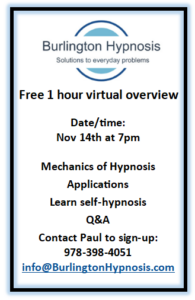Introduction
 Ever get the feeling your brain is running outdated software, where you find yourself hitting the snooze button ten times, munching midnight snacks, or dawdling like it’s an Olympic event? That’s because nearly 95% of what we do is orchestrated by our unconscious mind working silently in the background, controlling our habits and behaviors.
Ever get the feeling your brain is running outdated software, where you find yourself hitting the snooze button ten times, munching midnight snacks, or dawdling like it’s an Olympic event? That’s because nearly 95% of what we do is orchestrated by our unconscious mind working silently in the background, controlling our habits and behaviors.
Most people try repetition to exchange bad habits for good ones, but hypnotherapy gives you a faster, more efficient way like moving from dial-up to high-speed fiber optics in your head! With direct access to the subconscious mind, hypnosis can short circuit the normal path and speed up positive change, allowing you to drop old habits and build better ones easily.
Let’s delve into how habits develop at the subconscious level, why repetition is effective but slow, and how hypnotherapy is a science-based shortcut to permanent behavior change.
Subconscious Determines Habits
Imagine your subconscious as a huge warehouse where automatic reactions, learned associations, values and beliefs are shelved. Childhood experiences, cultural conditioning, and more shape our behaviors, many times without us even realizing it.
For instance:
- If you’ve linked sugar with comfort since childhood, you may have a hard time breaking the habit of emotional eating even when you know it’s bad for you.
- If you’ve been taught to fear failure, you may have difficulty creating confidence building behaviors such as goal setting or asserting yourself.
- If you were raised in a household where one or both parents were smokers you may also embrace this habit even though you understand the risks.
Traditionally, repetition has been the default method for reprogramming these unconscious habits. Neuroscience backs this up with the idea that “neurons that fire together, wire together.” In other words, repeating something again and again strengthens brain connections, so it becomes automatic after a period of time. But here’s the catch: it can take weeks or even months to cement a habit.
Fast Track to Better Days
Hypnosis accelerates habit formation by putting you into a very focused, receptive state linked with theta brainwave activity (the state in which deep learning takes place). The subconscious is more open to new suggestions in this state, so it is easier to swap negative habits for preferred alternatives. Unlike traditional habit creation, which relies on effort and repetition, hypnosis bypasses the critical, analytical part of your mind and speaks directly to the subconscious. Which is to say:
✅ Faster Habit Installation – Forget months of conscious reinforcement. Hypnosis facilitates easier installation of new habits that you want.
✅ Breaking Bad Associations – Hypnosis can retrain your brain’s emotional triggers, such as overeating due to stress or fear of failure causing procrastination.
✅ Boosting Motivation & Self-Control – Hypnosis affirmations can make you inherently want to be someone who enjoys exercising, eating well, or being focused without exerting coercion on yourself.
✅ Connecting Good Feelings to Healthy Habits – Hypnosis makes healthy habits fun, which more than anything else ensures your motivation.
Is Science Pro-Hypnosis?
 Most definitely! Research consistently supports the advantage of hypnotherapy in behavior modification and developing long-term habits. Stanford University Associate Chair of Psychiatry Dr. David Spiegel has done extensive research on hypnosis.
Most definitely! Research consistently supports the advantage of hypnotherapy in behavior modification and developing long-term habits. Stanford University Associate Chair of Psychiatry Dr. David Spiegel has done extensive research on hypnosis.
By his account, hypnosis alters brain function in areas that are engaged in the development of habits (e.g., prefrontal cortex and anterior cingulate cortex). Hypnosis also enhances cognitive control and self-regulation, enabling a person to more readily change deeply held habits. A meta-analysis published in the International Journal of Clinical and Experimental Hypnosis compared multiple studies and determined that hypnosis was highly effective at:
✅ tampering with automatic habits
✅ reducing stress
✅ improving concentration and self-control
Other neurology studies confirm that hypnosis heightens neuroplasticity, meaning your brain can rewire itself more quickly, speeding up the habit formation process.
Want to Explore Hypnosis?
Consult with a Certified Hypnotherapist. Private sessions can help with specific changes, from better sleep to stopping procrastination. Listen to Guided Hypnosis Recordings – Apps and audio classes reinforce new habits through frequent subconscious programming. Visualize & Mentally Rehearse – Hypnosis heightens visualization, so you can mentally rehearse and solidify new behaviors before they happen.
Closing Thoughts
While traditional repetition has the potential to rewire habits in the long run, hypnotherapy gives you a faster, more immediate route to subconscious transformation. Backed by cutting-edge research, hypnosis is scientifically validated to enhance neuroplasticity, self-regulation, and long-term behavior change. Whether you require more productivity, healthier habits, or stress reduction, hypnotherapy is a science-based method that easily brings about comfortable healthy change. Taking control never felt so good.
by: Paul Gustafson

 As a clinical hypnotherapist for more than 20 years, I’ve had the privilege to guide many of my clients toward transformative breakthroughs. While many approach hypnotherapy for specific goals such as quitting smoking, managing weight, or reducing stress, it is the unexpected benefits that ripple out from their sessions that always surprise both clients and me as well. These unintended, yet profoundly welcomed, shifts can include positive changes in emotional resilience, greater self-awareness, and even physical health in ways they may never have imagined.
As a clinical hypnotherapist for more than 20 years, I’ve had the privilege to guide many of my clients toward transformative breakthroughs. While many approach hypnotherapy for specific goals such as quitting smoking, managing weight, or reducing stress, it is the unexpected benefits that ripple out from their sessions that always surprise both clients and me as well. These unintended, yet profoundly welcomed, shifts can include positive changes in emotional resilience, greater self-awareness, and even physical health in ways they may never have imagined.
In this article, I’ll explore some of these hidden benefits, drawing on two decades of practice to illuminate how hypnotherapy can be a catalyst for profound, life-enhancing changes.
Heightened Emotional Resilience
Perhaps, one of the least spoken-about advantages of hypnotherapy is emotional resiliency. Many times, clients seek relief from a certain stressor or anxiety and find themselves leaving with an even more fortified inner toughness. That is where hypnotherapy does its work: gently accessing the subconscious mind, home of deeply imbedded beliefs and emotional patterns.
Hypnotherapy can enhance structuring of limiting beliefs, allow unresolved emotions to surface and be explored, offering sense of greater control to one’s inner landscape. By embracing routine hypnotherapy or meditation one becomes more resilient toward life’s many challenges. An example is someone who initially came hypnotherapy sessions for chronic work-related stress finding themselves entering high-pressure situations with calming confidence after a few sessions.
Improved Sleep
 While hypnotherapy does not always target sleep disorders, it generally helps a subject generally improve the quality of sleeping. Most sleep related disorders are related to stress, anxiety, and other overactive brain-related problems, in which hypnotherapy is quite effective in relieving.
While hypnotherapy does not always target sleep disorders, it generally helps a subject generally improve the quality of sleeping. Most sleep related disorders are related to stress, anxiety, and other overactive brain-related problems, in which hypnotherapy is quite effective in relieving.
Clients learn to quiet their minds and embrace a deeper sense of serenity through various relaxation and visualization techniques. Many find that the calming imagery from their sessions naturally replays in their minds as they drift off to sleep. This enhanced sense of well-being often leads to improved emotional and physical health, contributing to a better overall quality of life.
Enhanced Creativity and Problem-Solving
Creativity begins to flow when it disengages the conscious mind-to let the subconscious bring out those creative ideas and enhanced angles of perception. Hypnotherapy can be a useful tool fostering a client’s creative flow. Hypnotherapy routinely bypasses the analytical mind freeing up innovative thinking and fresh insight.
Past clients who happen to also be musicians, artists, and writers routinely report an enhanced creative flow because of their hypnotherapy experience. I would say that most clients experience unexpected freedom, clarity or relief unrelated to what they specifically came to fix with hypnotherapy.
Improved Physical Health
The impact of hypnotherapy on physical health often surprises clients. It certainly doesn’t replace medical care, but hypnotherapy compliments and often enhances conventional treatments through the decrease of stress and fostering of relaxation that is so important in general well-being.
Hypnotherapy can reduce the stressful anticipation of physical problems like discomfort in most instances which enhances personal control. Others have related the following: a decrease in blood pressure, improvement in digestion, and even quick recuperation from illness or injury once hypnotherapy enters their self-care routine.
Better Relationships
Indirectly, hypnotherapy can enhance personal relationships. It can soften self-limiting beliefs, emotional triggers, and offer improved perspective with unresolved conflicts, offering more clarity and compassion.
For instance, one client who couldn’t communicate well with his wife found out through hypnosis that as a child he had grown up feeling nobody listened to him. As he changed that pattern, he changed not only his inner talk but also how he related to his spouse.
Realizing Hidden Talents and Desires
 Hypnotherapy has the capacity to unlock areas a person may never have known or had forgotten existed. Hidden in the subconscious, deeper inside, lie the evolvement of hidden talents, desires, or dreams buried by routine and responsibility.
Hypnotherapy has the capacity to unlock areas a person may never have known or had forgotten existed. Hidden in the subconscious, deeper inside, lie the evolvement of hidden talents, desires, or dreams buried by routine and responsibility.
For one client, a middle-aged accountant, in this practice of visualization, he rediscovered the long-forgotten love of music; he started taking piano lessons and shortly thereafter, joined the local classic rock band, which unexpectedly improved his quality of life.
Increased Mindfulness
Hypnotherapy helps clients connect deeply with the present moment. They learn to observe their thoughts and feelings without judgment. This cultivated mindfulness often extends into their daily lives, enabling them to face challenges with greater confident clarity. For instance, this very anxious client learned how to anchor back into peacefulness by rehearsing experiences taken from their sessions. It wasn’t just the anxiety, which was significantly reduced, but also a new opened up leading to more consistent awareness and appreciation.
Confident Clarity
Hypnotherapy embraces self-trust and confidence resulting in enhanced intuition and inner wisdom. An example is one client who had great difficulty making a career change decision for quite a long period of time. Through hypnotherapy she started to hear that little voice within pointing in a specific direction filled with passion. In fact, the same client still views those sessions as a turning point for starting a fulfilling new chapter in her life.
Increased Productivity
The last advantage of hypnotherapy is that, often, it allows individuals to start more productively work in the direction of their goals. The path seems more direct, and the outcome seems much more attainable.
Routinely exploring the subconscious mind often leads to a more purposeful and enriching life because therein lies the true wish of the heart. One retiree, through hypnotherapy, relived his dream of serving overseas. It not only gave him the opportunity to experience his desire for a new adventure but also lifted his spirits and sense of purpose again.
Conclusion
Hypnotherapy is so much more than a means to fix a particular problem; it’s a gateway to self-discovery and change. Unexpected benefits ranging from improved creativity to better relationships prove just how interconnected our minds, bodies, and feelings truly are.
After all these years I am still impressed by the capacity we all have for growth and self-healing. The real magic of hypnotherapy is how it can offer specific relief, but how it can also open doors toward a more meaningful life. If you ever wondered what hypnotherapy can do for you, consider the unexpected-it just could hold the key to unlock your hidden potential.

 1 Winter Blues:
1 Winter Blues:
Hypnotherapy can also help combat seasonal affective disorder by literally rewiring thought patterns and then building a sense of warmth and well-being within.
2 Motivated and Energized:
Cold and darkness steal motivation. Hypnotherapy reinstates drive and consistency at work, during exercise, and in daily routines.
3 Improve sleep on long nights:
The winter disrupts the sleep patterns of millions of people. Hypnotherapy ensures deep, restorative sleep due to its calming action on the mind and stress reduction.
4 Stop Winter Comfort Eating:
Chilly weather along with holiday treats is the surest combination for overeating. Hypnotherapy can rein in cravings and support eating more mindfully to enhance healthier eating patterns.
5 Manage Stress:
Hypnotherapy offers clarity for the mind and complete relaxation while holidays are a time for chaos in planning, social obligations, and family gathering.
6 Boost Immunity and Mind-Body Healing:
When stressed, your immune system is weakened to make you more susceptible to cold and flu. Deep relaxation through  hypnotherapy encourages healthy immune function.
hypnotherapy encourages healthy immune function.
7 Ease winter aches and pains:
Cold weather exacerbates joint pain and stiffness. Hypnotherapy will modify your perceptions of such pain, decrease discomfort, and even help with physical relaxation.
8 Beat Cabin Fever:
Indoor confinement during this time can also foster irritability and restlessness. Hypnotherapy will help to reframe negative emotions to maintain an upbeat resilient mindset.
9 Focus and productivity:
Dark and dismal days result in foggy brains. Hypnotherapy sharpens you up for work, creativity or personal projects.
10 New Year‘s resolutions:
Most resolutions often fizzle out, while hypnotherapy cements motivation and good habits to ensure long-term success.

During the past fifteen years, hypnotherapy has emerged as a serious intervention for alleviating most physical, emotional, and psychological issues. Applications have expanded from alleviating chronic pain to minimizing stress and assisting individuals in overcoming traumatic experiences.
However, none of the major applications of hypnotherapy have reached mainstream health care status so far. This can be different in Massachusetts but only with proper legislative, educational, and professional modifications.
The Case for Mainstream Adoption
Over the years, several clinical applications of hypnotherapy have illustrated a foundational principle. Clinical evidence has established its efficacy in managing irritable bowel syndrome, reducing medication dependency related to anxiety, and even assuring better surgical outcomes owing to the pre-surgical relaxation methods it provides. Too often, public perception lags behind such advances, and hypnotherapy is still unfortunately associated with either stage tricks or pseudoscience.
This gap not only denies access to its benefits but keeps alive the skepticism against hypnotherapy in the medical profession. Massachusetts must bridge this gap by reforms in legislation, education, and setting standards in the profession.
Legislative and Regulatory Challenges
Massachusetts currently has no unified legislation controlling the practice of hypnotherapy. Unlike other professions, hypnotherapy is not subject to any standardization in terms of certification, practice, and accountability. The absence of such leaves room for untrained practitioners to offer substandard, ineffective sessions and damage the reputation of the overall field.
Legislation to provide for thorough training, certification, and standards of ethical practice would serve to protect the consumer, build credibility, and strengthen hypnotherapy as a valid health profession. The states of Washington and Colorado have proposed legislation that license and/or register hypnotherapists and therefore can be used as role models for Massachusetts. As point of reference naturopathic medicine, acupuncture and massage therapy are all regulated in Massachusetts.
Education
Education is paramount to practitioners and the public. In-service training programs would standardize key components of training, focusing on evidence-based techniques, ethical considerations, along with other elements of professionalism. The same standard accreditation through ASCH or IMDHA would confer a certain baseline level of credibility.
Public education is equally important. Community workshops, collaboration with health care, and media relations will help dispel some of the mystique associated with hypnotherapy and define all its valid applications. Hypnotherapy coursework in medical and psychological curricula may also facilitate its proper integration into clinical practice.
Defining Standards of Practice
For hypnotherapy to advance in Massachusetts, the standards of practice must be clearly defined. The following standards should be addressed:
- Licensure/ Certification Requirements: Practitioners should undergo training programs and certification examinations that reflect their competency.
- Ethical Guidelines: Issues of client confidentiality, informed consent, and professional boundaries should be guided by a code of ethics.
- Continuing Education: Ongoing training regarding new techniques and studies is necessary in order to maintain licensure or certification.
Such measures would put Massachusetts in the lead regarding the appropriate inclusion of hypnotherapy into mainstream healthcare.
The Future
Imagine a place like Massachusetts, where hypnotherapy becomes no big deal, a place where physicians refer patients for stress management sessions with a hypnotherapist, where hospitals offer hypnotherapy as an option in pain management, and where insurance companies recognize hypnotherapy as a reimbursable service. But this requires the collaboration of all of us: therapists, politicians, and educators.
Call to Action
It is a collective undertaking that will bring hypnotherapy to the mainstream. Professionals must act on legislative reform and professional standards. Educators and health professionals must be open and accepting to facilitate a seamless integration. As a result, he public becomes more aware of hypnotherapy which supports more access and broader acceptance of hypnotherapy.
Massachusetts will be the leader showing just how hypnotherapy can better the quality of life and healthcare outcomes. This would mean that if it is appropriately done, this peripheral modality will step into the mainstream, gaining the recognition and credibility it deserves as a vital component of holistic healthcare.

 In the ever-evolving battle with obesity, where diets often fail and surgeries are invasive, risky, and frequently ineffective, Virtual Gastric Hypnotherapy (VGH) is carving a new path. This groundbreaking approach harnesses the mind-body connection to simulate the positive effects of real-life surgery—without any of the risks.
In the ever-evolving battle with obesity, where diets often fail and surgeries are invasive, risky, and frequently ineffective, Virtual Gastric Hypnotherapy (VGH) is carving a new path. This groundbreaking approach harnesses the mind-body connection to simulate the positive effects of real-life surgery—without any of the risks.
What sets VGH apart is not just its non-invasive nature but its ability to empower individuals to redefine their relationship with food and nutrition. This article explores how this innovative technique works, why it’s gaining popularity, and what to expect on this transformative journey.
Science Behind VGH
At its core, VGH taps into the creativity of the subconscious mind, which governs habits, patterns, values, beliefs, and automatic responses. The subconscious doesn’t distinguish between vivid thoughts and reality, making it uniquely receptive to healthy suggestions. Hypnotherapists leverage this by planting suggestions that the subconscious accepts as truth.
In VGH, the suggestion is simple yet profound: a gastric band has been fitted around the stomach. This imagined band effectively reduces the stomach’s capacity, making clients feel full faster and with smaller portions. Unlike surgery, VGH avoids risks, recovery downtime, and physical side effects. Instead, it uses vivid imagery to inspire sustainable behavioral changes.
What to Expect
- Assessment and goal setting: The journey begins with understanding the client’s relationship with food. A certified hypnotherapist explores eating habits, emotional triggers, and weight loss goals to create a personalized plan. Whether addressing stress eating, portion control, or sugar cravings, the process is tailored to individual needs.
- Induction and relaxation: The practitioner guides the client into a state of deep meditative relaxation, where the mind becomes highly receptive to positive suggestions.
 Contrary to myths, hypnotherapy doesn’t mean losing control, it’s about regaining control from within.
Contrary to myths, hypnotherapy doesn’t mean losing control, it’s about regaining control from within.
- Guided imagery and virtual surgery: Clients are led through a vivid visualization of gastric band surgery, including arriving at the hospital, meeting the surgeon, and feeling the band being placed. For some, the experience feels remarkably real, though individual responses may vary.
- Post-surgery programming: After the imagined surgery, suggestions reinforce healthier habits, such as drinking water before meals, eating slowly, and stopping when comfortably satisfied. These cues help clients instinctively regulate their eating, fostering long-term change.
- Reinforcement: Clients are provided with digital recordings to reinforce positive changes at home. Weight loss is a journey, and repetition helps solidify newly preferred patterns, supporting lasting success.
Psychological Power of VGH
Unlike diets that rely on willpower, VGH operates on a subconscious level, rewriting deep-seated patterns around food. Emotional eating which is often triggered by stress, boredom, or past conditioning, is a significant barrier to weight loss. VGH addresses these triggers, fostering a calmer, more mindful approach to eating.
A key benefit of VGH is self-empowerment. Traditional diets often impose restrictive external rules, while VGH encourages clients to trust their instincts and listen to their bodies. This makes weight loss feel natural and sustainable.
 Why VGH Is Gaining Popularity
Why VGH Is Gaining Popularity
- Non-Invasive and risk-free: Unlike surgery, VGH involves no anesthesia, incisions, or post-operative risks. It’s entirely safe and suitable for most people.
- Cost-effective: Gastric band surgery can cost tens of thousands of dollars, while VGH is far more affordable and accessible.
- Holistic benefits: Beyond weight loss, clients report better sleep, reduced stress, and increased self-confidence. The relaxation during sessions also alleviates anxiety, improving overall well-being.
- No rebound effect: Many diets result in yo-yo weight changes when restrictions are lifted. VGH promotes sustainable lifestyle habits, reducing the risk of relapse.
Limitations of VGH
While VGH is highly effective, it’s not a magic solution. Success depends on the client’s commitment to adopting healthier habits and consistently using home reinforcement sessions. Results also vary based on factors like metabolism, stress levels, and underlying health conditions.
Also, choosing a qualified hypnotherapist is essential. Look for certifications from reputable organizations and read reviews to ensure you’re working with a skilled practitioner.
Future of Weight Loss
As obesity rates rise globally, innovative and sustainable solutions like VGH are becoming increasingly important. This method offers a glimpse into the future of weight management, where the mind becomes the most powerful tool for achieving a healthier body.
VGH goes beyond physical weight loss, addressing the psychological and emotional roots of overeating. By fostering lasting change, VGH represents a paradigm shift in how we approach weight management.
Is VGH Right for You?
If you’re tired of diets that fail and wary of invasive procedures, Virtual Gastric Hypnotherapy could be the solution you’ve been searching for. It’s safe, affordable, and holistic, offering more than just weight loss. It’s a journey toward greater self-awareness and empowerment.
Whether you aim to shed a few pounds or completely transform your relationship with food, VGH presents a compelling option. With the guidance of a skilled hypnotherapist and an open mind, you can take the first step toward a lighter, healthier you, one suggestion at a time.
by: Paul Gustafson

Paul is offering the first in a series of free virtual workshops Nov 14 at 7pm. Learn how it works, how it’s used and how to do self-hypnosis.

 Ever get the feeling your brain is running outdated software, where you find yourself hitting the snooze button ten times, munching midnight snacks, or dawdling like it’s an Olympic event? That’s because nearly 95% of what we do is orchestrated by our unconscious mind working silently in the background, controlling our habits and behaviors.
Ever get the feeling your brain is running outdated software, where you find yourself hitting the snooze button ten times, munching midnight snacks, or dawdling like it’s an Olympic event? That’s because nearly 95% of what we do is orchestrated by our unconscious mind working silently in the background, controlling our habits and behaviors.
 Most definitely! Research consistently supports the advantage of hypnotherapy in behavior modification and developing long-term habits. Stanford University Associate Chair of Psychiatry Dr. David Spiegel has done extensive research on hypnosis.
Most definitely! Research consistently supports the advantage of hypnotherapy in behavior modification and developing long-term habits. Stanford University Associate Chair of Psychiatry Dr. David Spiegel has done extensive research on hypnosis.
 As a clinical hypnotherapist for more than 20 years, I’ve had the privilege to guide many of my clients toward transformative breakthroughs. While many approach hypnotherapy for specific goals such as quitting smoking, managing weight, or reducing stress, it is the unexpected benefits that ripple out from their sessions that always surprise both clients and me as well. These unintended, yet profoundly welcomed, shifts can include positive changes in emotional resilience, greater self-awareness, and even physical health in ways they may never have imagined.
As a clinical hypnotherapist for more than 20 years, I’ve had the privilege to guide many of my clients toward transformative breakthroughs. While many approach hypnotherapy for specific goals such as quitting smoking, managing weight, or reducing stress, it is the unexpected benefits that ripple out from their sessions that always surprise both clients and me as well. These unintended, yet profoundly welcomed, shifts can include positive changes in emotional resilience, greater self-awareness, and even physical health in ways they may never have imagined. While hypnotherapy does not always target sleep disorders, it generally helps a subject generally improve the quality of sleeping. Most sleep related disorders are related to stress, anxiety, and other overactive brain-related problems, in which hypnotherapy is quite effective in relieving.
While hypnotherapy does not always target sleep disorders, it generally helps a subject generally improve the quality of sleeping. Most sleep related disorders are related to stress, anxiety, and other overactive brain-related problems, in which hypnotherapy is quite effective in relieving.
 Hypnotherapy has the capacity to unlock areas a person may never have known or had forgotten existed. Hidden in the subconscious, deeper inside, lie the evolvement of hidden talents, desires, or dreams buried by routine and responsibility.
Hypnotherapy has the capacity to unlock areas a person may never have known or had forgotten existed. Hidden in the subconscious, deeper inside, lie the evolvement of hidden talents, desires, or dreams buried by routine and responsibility.

 1 Winter Blues:
1 Winter Blues: hypnotherapy encourages healthy immune function.
hypnotherapy encourages healthy immune function.

 In the ever-evolving battle with obesity, where diets often fail and surgeries are invasive, risky, and frequently ineffective, Virtual Gastric Hypnotherapy (VGH) is carving a new path. This groundbreaking approach harnesses the mind-body connection to simulate the positive effects of real-life surgery—without any of the risks.
In the ever-evolving battle with obesity, where diets often fail and surgeries are invasive, risky, and frequently ineffective, Virtual Gastric Hypnotherapy (VGH) is carving a new path. This groundbreaking approach harnesses the mind-body connection to simulate the positive effects of real-life surgery—without any of the risks. Contrary to myths, hypnotherapy doesn’t mean losing control, it’s about regaining control from within.
Contrary to myths, hypnotherapy doesn’t mean losing control, it’s about regaining control from within. Why VGH Is Gaining Popularity
Why VGH Is Gaining Popularity










